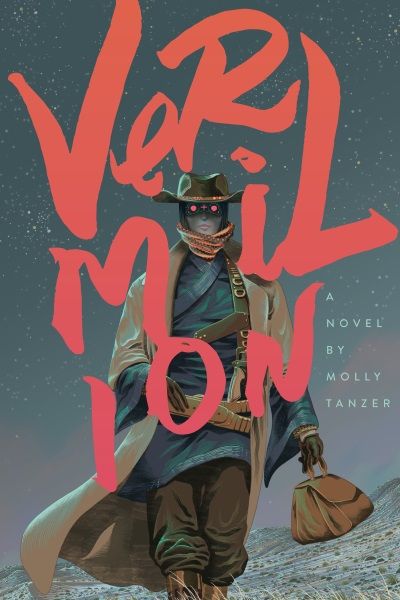A Weird Western
Vermilion; the Adventures of Lou Merriweather, Psychopomp
By Molly Tanzer

9 Nov, 2015
0 comments
2015’s Vermilion; the Adventures of Lou Merriweather, Psychopomp is Molly Tanzer’s debut novel. It’s an example of something I call Weird Westerns , a cousin to works like Findley’s Tex Arcana and Sumner’s Devil’s Tower books.
Daughter of a white psychopomp and a Chinese apothecary, Elouise “Lou” Merriweather has taken up her father’s calling, sending the restless dead to the next world. It’s a dangerous calling, but as a person of mixed race (not to mention a woman who prefers men’s clothing) in the exuberantly bigoted world that is 19 th century America, it’s not as if Lou has a lot of career options open to her.
Now Lou is adding a new occupation to her career portfolio: consulting detective. Chinatown’s young men have been heading into the interior of Colorado, enticed by a dubious job offer. None have returned. The authorities could not care less what happens to Chinese-Americans, so it falls to Lou to accept a commission from her estranged mother and investigate the case of the disappearing men.
What she finds is
a health spa. And not just any health spa! This one is rumored to have access to a Fountain of Youth. In a world where bears talk, ghosts walk, and dragons fill the skies of China, it’s hard to sort out what’s delusion and what’s real, so the patrons of the spa can be forgiven for succumbing to what sounds like 19 th century snake oil.
There is a grain of truth to the spa’s claims: two of the staff can legitimately claim great age. This is less thanks to some chimeric fountain of youth and more due to ancient alchemy and the fact that one of them is a bloodsucker.
The vampire is focused on an ambitious scheme to reopen America’s frontier, lost thanks to a Civil War treaty, but, if needs must, he will stoop to dealing with one all too nosy woman from out west.…
~oOo~
I’m not the best reader for books like this, because I get hung up on issues of world-building Even though I know the conceit is “a world like ours, but where magic and monsters are real,” I still wonder how you can add vampires, talking bears, and the occasional dragon to our history and get a 19 th century that looks anything like ours1. I had much the same issue with Novak’s Temeraire, which I compared to Veni, Vidi, Vici Through Airpower played straight.
One odd theme pops up in all many Weird Westerns: survival of the Confederacy. It appears in this book too. And … the settlement that ended the Civil War also included a concession to the talking Bears who fought on the Union side. The bears get to keep the Western territories, as wild and free Bear country. If that’s what the Bears get, and the Confederacy survives, I have to wonder just who or what was fighting for the rebels in order to produce that sort of negotiated settlement.
In one Weird Western, Wrede’s Frontier Magic series, Native Americans were quietly erased. I presume that the impetus here was not to undermine the fun of the Old West by admitting the reality of the Old West. That authorial decision bothered me in the Wrede books; it would have been outrageous if Tanzer, writing a book about prejudice and stereotyping, had taken the same tack. There are Native Americans in this book, but it seems that they didn’t do much better in this alternate history than they did in the real world. It seems very odd that the Bears managed to win the sort of lasting concessions (territory and rights) that Native Americans never managed to win or keep2.
A reviewer who was not me would probably peg Lou as a cross-dresser. I saw her as someone who just wants to dress comfortably. If that outrages gender conventions, too bad. Since society disapproves of mixed-race Lou simply for existing, she sees no point in trying to win acceptance by dressing up in proper female attire. Even if she looked like a fashion plate from Godey’s Lady’s Book , the people around her would still treat her badly.
The novel’s cast is diverse, in lots of different ways. Too bad for them that they live in an America where diversity is an affront to right-thinking people. At least their author is sympathetic.
Vermilion is available from Word Horde3. Judging by the book’s ending, sequels are not out of the question.
1: For example, if you live in a world where resurrections are a daily fact of life, this is going to undermine the specialness of any particular example. And this goes double if that world’s usual means of gaining life beyond death is socially unacceptable (i. e. vampirism or zombification). But if the secondary world is to be constructed of the familiar (the real world) plus the strange (the fantastic), authors are tempted to ignore logic and consistency. It’s just too difficult to rethink the world completely … which would also remove all the familiarity.
In a previous review, I wondered “if there are living angels wandering the world, how is there even a Paris?” Perhaps I need to ease up a bit on alternate world fantasies.
2: The concessions to the Bears include an end to railway construction in Bear country, which should have had (an for all we know did) a significant effect on the course of US/Native American relations. More of that dang worldbuilding!
3: Not to be confused with publisher Word Hord Press.
